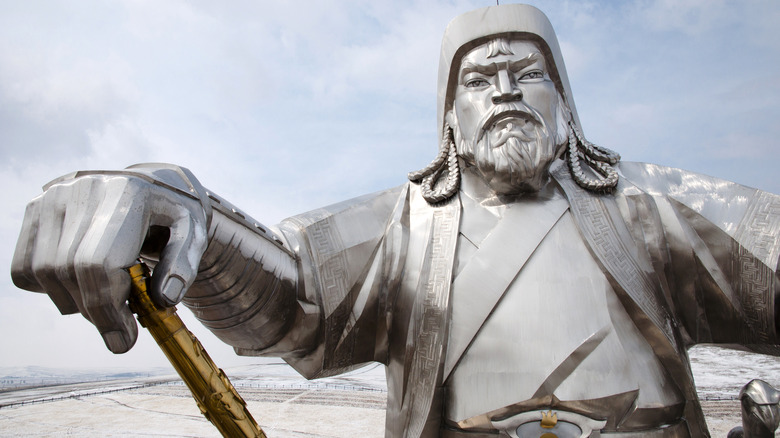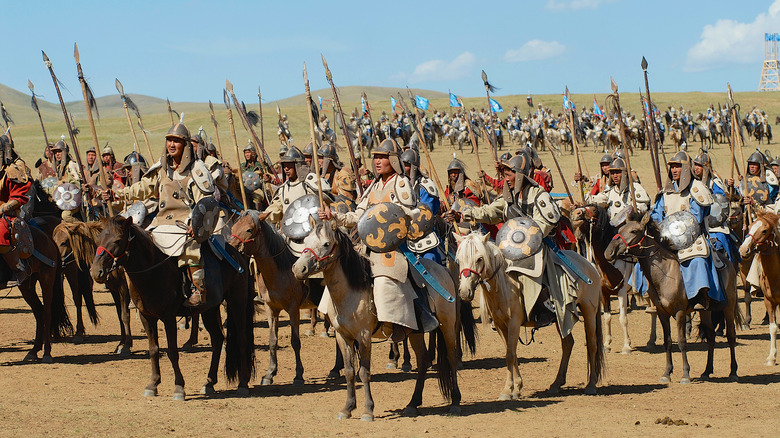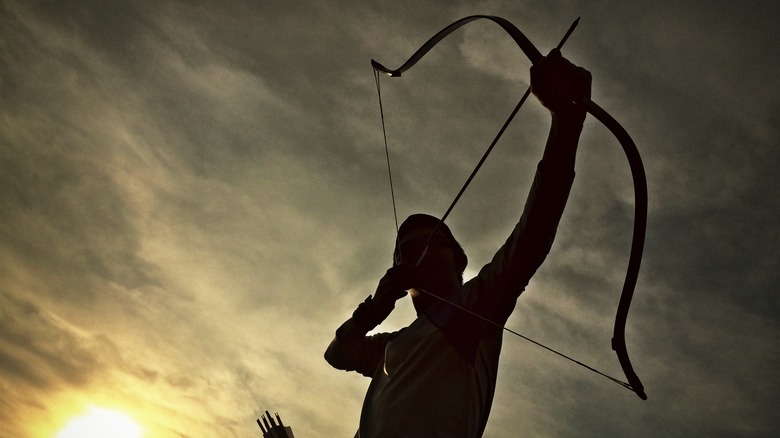Genghis Khan Rewarded The Man Who Almost Killed Him In The Most Unusual Way
Genghis Khan is one of those historical figures steeped in as much legend as fact. A big part of the mythos built up around Genghis Khan, originally named Temujin, comes from when and where he lived: the 12th century Mongolian plateau. Khan, who lived about A.D. 1162 to 1227 (via History), didn't grow up in a literate society. When he came to power in the early years of the 13th century, he commissioned the Uyghur scribe Tatar-Tonga to draft the region's first standardized script, Mongol Bichig, as K-12 Academics says. Subsequent writings about him would definitely be more than a bit biased.
Case in point: legend says he was born very symbolically clutching a blood clot in his right hand. Legend also says he always overwhelmed enemies by sheer numbers, which as Discovery Place tells us, just isn't true. He often used advanced siege tactics, and campfires at night to make his own army appear much larger. He did, however, have an obscene number of female companions; about 8% of all men on the Asian continent carry his genetic stamp, per a study published on the National Library of Medicine. Born into a life of violence and poverty, Khan was at once a brutal warlord who killed over 40 million people, while also promoting rule of law, ethnic inclusivity, religious tolerance, and more, via Owlcation.
Most pointedly, Khan operated a meritocracy amongst his troops. This helps explain another Khan legend about the rise of one of his generals, Jebe.
Battle on the plains
The tale of Jebe comes in two different forms, and like many tales of Genghis Khan himself, rings of myth. Jebe was born Zugudai, likely sometime in the 12th century, because by 1201 he was fighting against Khan in the Battle of the Thirteen Sides. As Ancient Origins states, sources describe Zugudai as a member of the Besud clan of the Taichud tribe. Beyond that, we don't know much other than he was probably "poor," as About History says.
One version of the story describes Zugudai firing off an arrow during the battle and wounding Khan. Some versions state that the arrow hit Khan right in the neck (via War History Online). After the battle was over, Khan asked his captors who had shot his horse — not him, presumably to portray invulnerability to his troops — and Zugudai very bravely spoke up and said that it was him. He then swore to serve Khan if Khan spared his life. The other version of the story describes Khan chasing after members of the opposing army, and Zugudai firing off an arrow while in retreat. The arrow hit Khan's horse, killed it, and then when Zugudai was captured, he promised to make up for it by getting lots of other horses for Khan.
Khan, as the tale goes, took Zugudai's promises seriously and made the man one of his generals. He also renamed him "Chepe," which simply means "Arrow." Over time, "Chepe" became "Jebe."
The arrow of Khan
In 1204, three years after the Battle of the Twelve Sides when Jebe apparently wounded Khan and/or Khan's horse, Khan faced off against the Naiman tribe, as Ancient Origins says. At this point, it's important to remember that "Khan" was a title, and Genghis Khan was one of many tribal leaders. So when he defeated the Naiman tribe — itself composed of various other tribes banded together to fight him — the Naimans split and fled in multiple groups. Khan then deployed his "Arrow" — Jebe — to hunt them down. Jebe did so until 1211, when Khan called him back to help in the conquest of the Jin Dynasty, which fell in 1215. In this way, Jebe fulfilled his original promise and grew in power and stature in Genghis Khan's army.
One standout episode came when Khan, ever the rapacious invader, attacked the Khwarazmian Empire west of India from 1219 to 1221, which encompassed parts of modern-day Iran, Afghanistan, Turkmenistan, and more. Jebe was a part of this force as well, and then a part of the force that faced off against the Russians in the Battle of the Kalka river. Khan, it should be noted, conquered land all the way to Eastern Europe.
Legends say that Jebe became so powerful of a military leader that Khan became wary of him. Upon hearing this, Jebe decided to assuage his warlord's worries by giving him a gift of 100 white horses.


